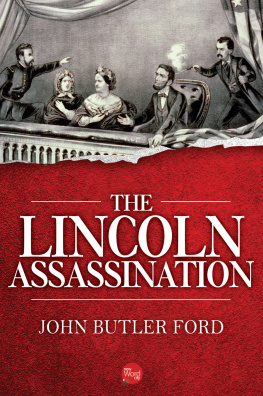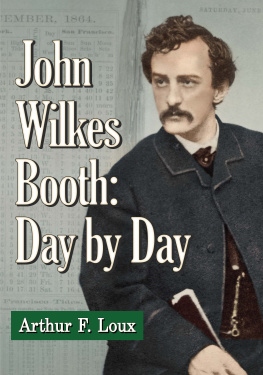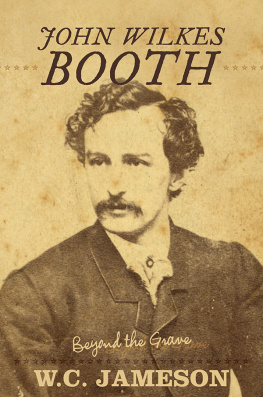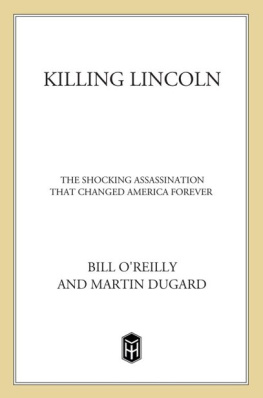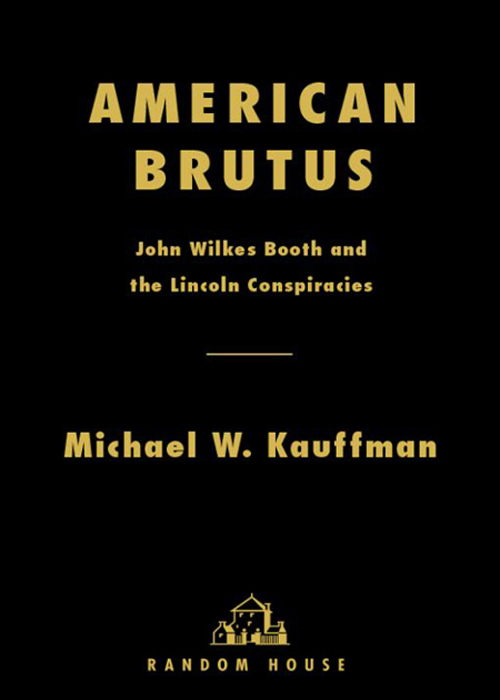
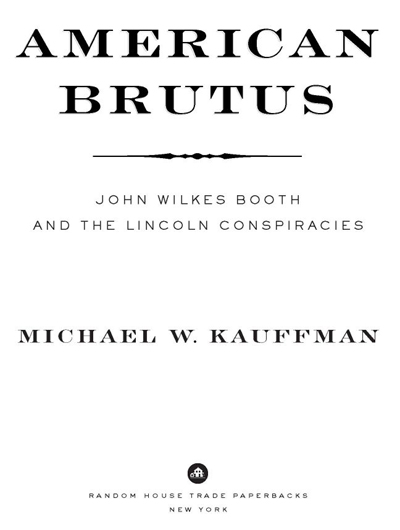
Table of Contents
For Mary, Emily, and Brian
and in memory of
Michael E. Patten and Lea Anne Brown
Praise for American Brutus
Booths scheme, as this book intricately reconstructs it, involved much more careful, long-range calculation than has previously been acknowledged.... Mr. Kauffman seriously challenges conventional wisdom. JANET MASLIN, The New York Times
Kauffmans often minute-by-minute account of the night of [Lincolns assassination] and its confused aftermath is a wonder of modern scholarship, and his tracing of the histories and motivations of the oddball group of men who followed Booth down this path to destruction is first-rate.... [Booth] managed to weave a web of confusion that almost 150 years later has been fully unraveled only by Kauffmans patient scholarship. San Francisco Chronicle
Kauffman tells his story with vigor and skill.... There can be no doubt that he has done a superb work of research and analysis. The Boston Globe (top ten nonfiction book of the year)
[The book] is a well-told story of Americas most famous tragedy, related in a manner that gives fresh meaning to each part of it. Along the way, Kauffman challenges a number of conspiracy theories, but his main purpose is to provide an accurate, compelling account of the assassination and its aftermath. St. Louis Post-Dispatch
In this crisp work of narrative, Kauffman corrects the record.... Like many assassins, Booth led perhaps too rich an interior life. In AmericanBrutus, Kauffman captures it perfectly. Bloomberg News Service
[Kauffman] makes a good case for considering his book the last word on the nearly 140-year-old crime. Los Angeles Times
[American Brutus should] settle all the arguments that have raged for nearly a century and a half about Lincolns assassin and his cadre of pathetic lunatics and misfits. Kauffman has done incredibly detailed research and is able to trace Booths movements almost minute by minute. We know how the story ends, but he still manages to keep the reader in suspense. JONATHAN YARDLEY, The Washington Post (one of the best nonfiction books of the year)
The great values of Kauffmans approach are dispassion and mastery of documented detail. Here is the best picture that todays Americans can expect as to what happened, how, and why. Baltimore Sun
An exhaustive and well-written examination of Lincolns killer and the years leading to that fateful night at Fords Theatre. San Jose Mercury News
Thoroughly researched... In Kauffmans vivid and often fresh telling, Booth was ruthless in pursuit of his goal.... What is so remarkable, as Kauffman amply demonstrates, is how close Booth actually came to killing the three leading executives of the United States. The New York Times Book Review
The reconstruction of Lincolns assassination is as spellbinding as a Law& Order episode.... Mr. Kauffman creates a gripping portrait of Booth, not as failed actor or Confederate agent, but as a glory-obsessed manipulator. The Dallas Morning News
Michael W. Kauffmans American Brutus is several unlikely combinations rolled into one: a meticulous history with propulsive narrative power, a fresh take on one of the most examined events in American history, and the eminently rational and convincing product of a raging obsession. LAURA MILLER, Salon.com
INTRODUCTION
ON THE NIGHT OF APRIL 14, 1865, PRESIDENT ABRAHAM Lincoln was shot by an assassin as he sat in a Washington theater. At the same time, his secretary of state was savagely attacked in his home a few blocks away. Investigation revealed that other men had also been targeted: the vice president, secretary of war, and general in chief of the army. There were subsequent reports of germ warfare, of plans to burn ships and cities, and of a proposal to poison the New York City water supply. The prospect of further attacks kept the nation on edge, and every citizen was on the alert for any sign that terrorists were in their midst. Hundreds of suspects were rounded up on the vaguest suspicions, and some were arrested on looks alone. Of those, many were kept in isolation, bound and hooded, to await a trial by military tribunal. The reaction was unprecedented.
Who did this, and why? How large a conspiracy was behind these attacks? Is this the end, or will more follow? How far can we bend the rule of law to find and punish the conspirators? These were the questions on everyones lips.
Investigations in 1865 were crude by modern standards. Detectives did not have electronic money transfers, telephone records, or e-mail traffic to track the conspiracy to its roots. Nor did they have the time. After the assassin, John Wilkes Booth, was killed and brought back to Washington, the government turned its attention to Confederate officials and the suspects they already had in custody.
Since then, little has been done to investigate the full extent of the plot, to sort out the conspirators movements, or to explain the motives behind Lincolns killing. While new versions of the story are regularly published, they are never based on the best sources, and often rely heavily on the worst. None have critiqued the conspiracy trial with 1860s criminal law in mind. None have examined Booths mental state based exclusively on facts, as opposed to folklore. And none seem to have considered the key clues to the assassins own world: the views he espoused, the profession in which he worked, the society in which he moved. They have lifted him out of his own time and surroundings, as if such things were irrelevant. Borrowing heavily from other sources, they then repeat their same mistakes.
The Lincoln conspiracy demands another look. Generations of readers have been fascinated by its drama, its intrigue, and especially by its leading character. John Wilkes Booth was a captivating person. Traveling in the highest social circles, with a roster of friends that included some of the most notable people of the era, he was remembered fondly even by Unionists. This, I think, is the real mystery of the case. How could this lover of nature, this gentle poet who touched so many hearts, who frolicked on the floor with his nieces and nephews, and who practiced sign language in order to converse with a deaf poetesshow could this man be the embodiment of evil, and the perpetrator of such a cold-blooded crime? This question lies at the heart of the story. Without examining it, we can never hope to understand the one mad act that played such a momentous role in the shaping of our nation.
Many writers contend that Booth was not the guiding spirit of the plot, that he was little more than a rabid Southerner whose mind lost its balance as both the Confederacy and his professional career collapsed, and that he acted merely as a pawn, following the orders of a larger cabal. And though some authors have taken pains to find (or fabricate) a connection between him and some sponsoring organization, they have all failed to take even the most basic steps to sort out the movements of this criminal conspiracy. Invariably, they oversimplify, and in doing so, rob the story of its essential interest.
Most pundits now agree that the conspiracys original intent had been to capture the president. The public first assumed that Confederate officials had urged Booth to do so. Later accounts averred that a coup within the Lincoln administration, led by Secretary of War Edwin Stanton, had set the plan in motion. At various times the Catholic Church, the secret Knights of the Golden Circle, and unnamed Jewish bankers were also blamed for the killing. The literature has come full circle, and in recent years has implicated Confederate leaders once more. Each of these theories was constructed using dubious reasoning rather than hard evidence. None gave much weight to the temper of the times.
Next page

